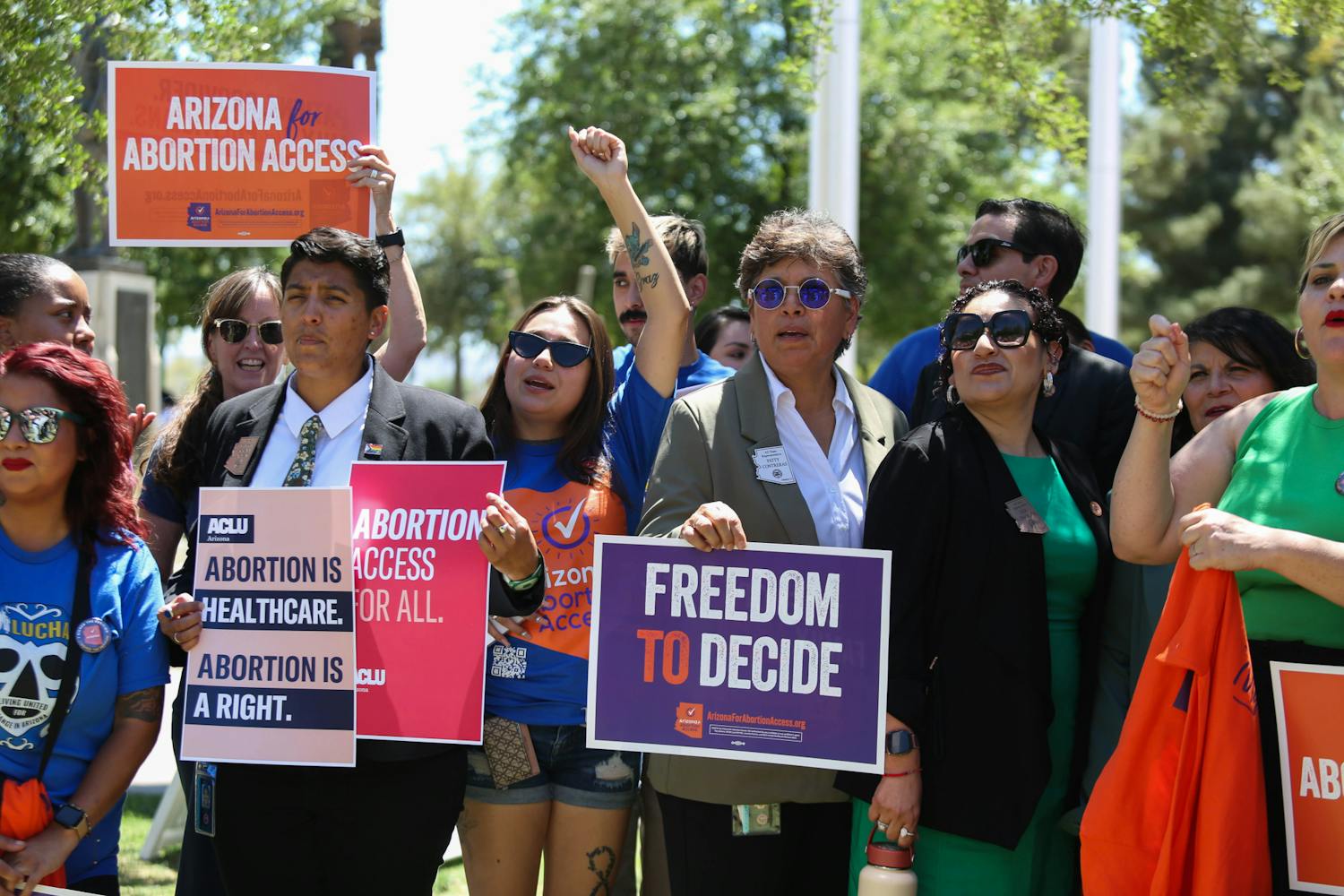Podcaster Austin Westfall sits down with ASU assistant Professor, YoungJu Shin. Shin was names as one of the US-Korea Next Generation Scholars, program designed to mentor the next generation of Korea specialists in the United States. Shin covers what she hopes to accomplish with the program as well giving her take on the current relations between the United States and the Koreas.
Austin Westfall: Hello and welcome to After Hour. I’m Austin Westfall. This podcast primarily explores topics relating to ASU, the discussions and issues we have here on campus. But we're going to move slightly away from that today and deal with something that's on the global radar. Dr. YoungJu Shin is an assistant professor at the Hugh Downs School of Human Communication at ASU, and she was recently named one of this year's U.S.-Korea Next Gen scholars. There's only 11 of you that were selected for that in the country. Thank you for being here today. I appreciate it. Coming to the downtown campus especially to talk to me. First of all, the whole point of the scholar program is to make you a communications specialist. What exactly does that mean?
YoungJu Shin: Ok so I have to briefly explain what it is to be selected as a U.S.-South Korea, and North Korea at this point, Next Generation Scholar.
Austin Westfall: Because this is something that hasn't happened yet. You have not participated in the scholar program yet.
YoungJu Shin: Yes. At this point, I was selected. I was chosen for the program of 2018-2019, but our very first training/workshop will take place in Washington D.C. in December. So, although we are definitely on the radar of what will be happening for the entire years of our activity, I have not fully participated, immerse myself into the program, of what it will be like. So, I would be happy to share more of the information later on. But at this point, going back to your question, what would be my role as communications specialist is understanding the current politics. You know like a public discourse is going on between U.S. and Korea. You know, I have to say in general that we understand that there are a lot of conversations, and they're very exciting. I have to say personally exciting and surprising, the cultural dialogue in terms of political communication.
However, what I want you to see between those two countries, and also more people involved in the conversations overall, is to talk to you about the communication aspect, meaning that it's not a matter of language anymore between English versus Korean. It's more about how we can fully understand what we are talking about. Although, we have the same goal and agenda for the public discourse, sometimes it may be different. If we come from two different cultural backgrounds and the way we communicate definitely matters a lot. So for example, one person can think(that) I just (said) one sentence, but the other person definitely can interpret differently. Sometimes not having full understanding of those cultural backgrounds and the norms and the values — it's not easy to be on the same page.
Austin Westfall: And you moved to America from South Korea. You grew up in South Korea.
YoungJu Shin: Yes.
Austin Westfall: You moved here in 2003.
YoungJu Shin: Yes.
Austin Westfall: And so, were these same issues that you were facing when you moved here?
YoungJu Shin: Well, I have to say examples of going through a culture shocks. You know, you can ask me, I can share hundreds of different stories (and) talk to you about what is a culture shock, reverse culture shock, things like that. So with that being said, yes. Definitely. I have spent almost my undergrad year in the south in South Korea, finished out, and then spend my last year as a senior exchange student in the States and then moved forward with higher education here in the States.
Austin Westfall: Speaking of culture shock, you moved from South Korea to Indiana.
YoungJu Shin: Yes, there was a lot of differences, I have to say.
Austin Westfall: So you, naturally, coming from South Korea and now living in America for 15 years, you must be all over all this news that's happening. This is such a newsworthy time as far as Korea and American relations go. You know what, there's plenty of things that I could go over, I want to ask you what do you think is the single most important thing that's happening between the two countries right now? I should say three countries because South Korea, North Korea, and...
YoungJu Shin: Yes, that's what I was going to say that it's very exciting. We all understand that in history that you know South Korea and the United States has always been a good relationship. You know. we declare ourselves and hopefully we are the same in the future that we are allies for each other.
However, the relationship with North Korea has dramatically changed. I'm talking about the relation between North and South Korea over this past couple of years and then also the relationship between North Korea and the United States overall as well. So going back to your question, it’s very exciting to see (that) this conversation is happening right now. Because, this is something that I have to say, as an ordinary citizen of South Korea at this point, you cannot imagine that in my life we actually had finished third round of the summit meeting happen in Pyongyang, North Korea. And I was like "Wow, that was very impressive to see those two leaders in Korea actually sit together," and then come to the conclusion that they both agree. And here I talked about political perspective and also cultural perspective that we are on agreement of consensus of wishing peace in Korea.
Austin Westfall: And a lot of this, I think a lot of the conversation that people talk about is denuclearization.
YoungJu Shin: Yes.
Austin Westfall: And that's something that came up when Trump held his first summit with Kim. They talked about I think, I want to get the quote right. I do have it here. So they said that they wanted to take steps to denuclearize. This is what Kim said.
YoungJu Shin: Yes.
Austin Westfall: And what does it mean for South Korea when Kim and Trump make these summits?
YoungJu Shin: I have to say it was big news in the beginning. I think sometimes South Koreans in general find ourselves in a situation (where) we actually don't have any control. Although we wanted to see so good things happening between North Korea and the United States, sometimes we just don't have a lot of influence. We’re used to not having a lot of influence over those two countries when it comes to North Korea and the United State relations. At this point, what makes us as a Korean more excited is the role, a mediating role, of President Moon. You know, he has been really putting in his effort and trying to convince the conversation that could bring those two parties together on the same page, and then try to help those two leaders negotiating these complicated matter(s), right? And then try to settle down with a moment of peace of course.
Austin Westfall: As a South Korean citizen, are you optimistic right now?
YoungJu Shin: I have to say, yes I am. At least that the matter of fact is that Kim Jong, he’s used hiding himself, trying to avoid productive conversation. Just arguing for what he needs, what the country needs, right? At this point, he recognized the fact that you know for North Korea to survive through financial hardship, whatsoever that they have to face, he has recognized that those are things that he has to give up. It’s trying to be win-win situation. I do hope that it will be a win-win situation for all those three countries overall.
Austin Westfall: It's a major shift in personality for the leader of North Korea.
YoungJu Shin: Well I do have to say that, right now, North Korea’s leader is similar to my age. So he's like mid 30s, and he did actually (have) experience interacting with people from different countries and different cultures, and he's also aware of different political systems. That would be another thing that differentiate(s) his characters from the former two leaders.
Austin Westfall: His father and grandfather.
YoungJu Shin: Yeah, the third generation of North Korea leaders, actually right now, actually has a better sense of what's going on in the world.
Austin Westfall: He might have a more open mind.
YoungJu Shin: Exactly.
Austin Westfall: So, we are running out of time. I just want to understand what exactly are you looking forward to most as you embark on this. This is this is exciting. This is a great opportunity, obviously, to be traveling. So, what's in store for you?
Young Ju Shin: Ok. I do want you to definitely let you know you have a voice from a personal level, (an) ordinary citizen of South Korea. You know, it's an honor for me to be a part of a conversation with policymakers in D.C. and then South Korea as well. That would to be something that I personally felt so excited. Looking forward to being a part of that conversation. At the same time as a scholar, I also want you to understand intercultural dialogue. I do want you to contribute to the conversations. At least as a specialist, communications specialist point of view, that (is) how conversation communication matters among people. So my role, I would anticipate, is to look at more about what we’ll be discussing in terms of cultural perspective in general.
Austin Westfall: Right, and one thing we were talking about, even before we started recording, was you know, really understanding how these relationships can affect us here locally in a city like Phoenix. Because you know that's such a broad global relationship, but there's got to be ways that it affects us on a smaller local level. That’s something you're looking forward to figuring out as well.
YoungJu Shin: Yes, absolutely.
Austin Westfall: Well, Dr. YoungJu Shin is an assistant professor at the Hugh Downs School of Humans Communications at ASU, and she was recently named one of this year's U.S. Korea NextGen Scholars. Congratulations, and thank you for joining me.
YoungJu Shin: Thank you so much.
Austin Westfall: That'll do it for this episode of After Hour. I’m Austin Westfall. Be sure to follow The State Press on Twitter @StatePress and online at StatePress.com.
Contact the podcaster at austinwestfall1@gmail.com or on Twitter @WestfallAustin
Like The State Press on Facebook and follow us on Twitter @StatePress




